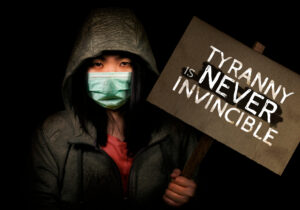BEARING WITNESS: THE FIGHT FOR HUMAN RIGHTS AND THE STORIES THAT INSPIRE CHANGE
By
Sophie Richardson, PhD

We all carry stories with us. Sometimes it’s a particular case or place; sometimes it’s a voice or an image.
For me it’s the picture of a young boy, clad in funeral white, hands pressed against his forehead in anguish, facing plastic riot shields held by Cambodian police as they blocked the May 1996 procession for the child’s father, murdered opposition newspaper editor Thun Bun Ly. It’s imagining the horror that must have paralyzed the wife of Filipino pastor Andy Pawikan in May 2006 as he, holding their months-old daughter, was taken away by police and shots rang out; the baby—and Pawikan’s body—were returned hours later. It’s the raw agony in Liu Xia’s voice as she called out in April 2013 to foreign reporters in Beijing, “I am not free”; as the partner of China’s most prominent democracy activist, 2010 Nobel Peace Prize winner Liu Xiaobo, she was at that time halfway through an illegal, eight-year house arrest that only ended a year after his death.
I think about another Chinese human rights defender, He Fangmei, and her children. Like many activists, He was galvanized into campaigning for vaccine safety after her infant daughter was harmed by tainted medications in March 2018. Authorities made their displeasure with her advocacy and growing network known by subjecting He to months of arbitrary detention in 2019 and 2020, including in a Henan psychiatric facility, where she was held with her paralyzed child and gave birth to her third child. He was formally arrested in March 2022 on baseless charges of “picking quarrels and stirring up trouble,” tried without a lawyer, and in October 2024 given a five-year sentence. Her younger children were removed from the psychiatric facility in April 2024—and haven’t been seen since.
I first went to China in August 1989, just months after the government’s bloody crackdown on peaceful protesters in Beijing at Tiananmen Square and in other cities across the country. I was irrevocably changed by seeing people my age having to sit, hour after hour, day after day, through mandatory political thought classes that autumn. I had come from a world that afforded me exactly the opposite. And I couldn’t figure out why that was or should be the case. All those young people, and all the people described here, had tried to do was share information, support their communities, seek justice—things I could and can easily do without risk, living in an environment of far more predictably secure rights.
The least I—we—can do is remember what courageous individuals endure to assert their rights. Human rights work takes many different forms—law, medicine, teaching, social work, government service, advocacy. But at its core it’s about human beings and their experiences. This is what makes Humanitas Media so special, and so very essential in this moment of extraordinary threats to human rights and democracy: an unapologetic concern for people, and a call to empathetic action. Powerful actors around the world, including in the U.S., are trying to silence critical voices. We resist and succeed by remembering and making use of our own rights to fight for He Fangmei, for human rights defenders worldwide, and for positive change for everyone.
—
Dr. Sophie Richardson is the co-Executive Director of the Network of Chinese Human Rights Defenders (CHRD), a coalition dedicated to advancing human rights and grassroots activism in China through peaceful, democratic reform. She speaks Chinese and has spent over three decades researching political repression and civil liberties in China and Southeast Asia. She has testified before the U.S. Congress, the Canadian Parliament, and the European Parliament, and is the author of China, Cambodia, and The Five Principles of Peaceful Coexistence. Her work contributes to global efforts to defend human rights in the face of authoritarianism.

